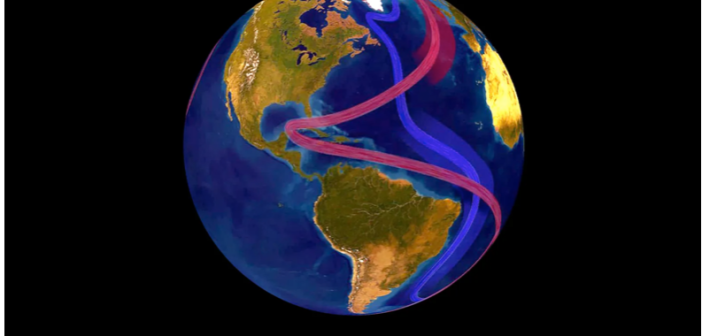Sea water temperatures hit a scorching 101.1 degrees Fahrenheit earlier this week for the first time in history off south Florida, threatening coral reefs and all marine life. Meanwhile, a new study says that the major currents in the Atlantic Ocean, including the Gulf Stream, could weaken and hit an irreversible “tipping point” as soon as two years from now, affecting sea levels and weather patterns in the U.S., Canada and Europe.
In the Florida Keys, unprecedented ocean temperatures have caused a mass bleaching of coral reefs. Marine scientists say many reefs are now completely bleached, or already dead. They worry that reefs at greater depths also could be damaged if the warm ocean temperatures continue.
In a far broader picture, a new study says that global warming, including ocean ice melts in the Arctic and Antarctic, could cause a weakening of vital currents in the Atlantic. That tipping point, according to a new study by two Danish scientists, could come as early as 2025 and certainly will happen before the end of this century – much earlier than others had predicted.
The study, by Peter and Susanne Ditlevsen, siblings and professors at the University of Copenhagen, was a statistical analysis of water temperatures in the Atlantic dating back to 1870. It looked at the Atlantic Meridional Overturning Circulation, a conveyer belt that carries warm water from the tropics up the Gulf Stream past the U.S. and Canada and then bends toward Europe and relays cold salt water from the North Atlantic down south.
The Ditlevsens’ study, published this week in Nature Communications, predicts a tipping point in the AMOC that “would have a severe impact on the climate of the North Atlantic region.” They wrote, “We estimate a collapse of the AMOC to occur around mid-century under the current scenario of future emissions.” They said that point “is most likely to occur around 2025-2095 (95 percent confidence interval).”
A tipping point, involving the loss of ice from the Arctic and Greenland down to the Antarctic, would have a cascading effect with warmer ocean water causing changes in eco systems and weather patterns in the Northern Hemisphere and Europe, even shifting tropical rain belts that have been stable for thousands of years.
The study says that if the AMOC weakens, much of the Northern Hemisphere could cool, the coastlines of North America and Europe would rise, and Northern Europe would have more winter storms.
Climate scientists have predicted the weakening of the AMOC, but most previous studies predicted an irreversible tipping point many years later, toward the end of this century. For her part, Susanne Ditlevsen says the time to worry is not in the future. “It’s now,” she said.
Other scientists may debate the timing, but not the gravity of the problem. “It is very plausible that we’ve fallen off a cliff already and don’t know it,” Hali Kilbourne, a professor at the University of Maryland Center for Environmental Science, told The New York Times. “I fear, honestly, that by the time any of this is settled science, it’s way too late to act.”




